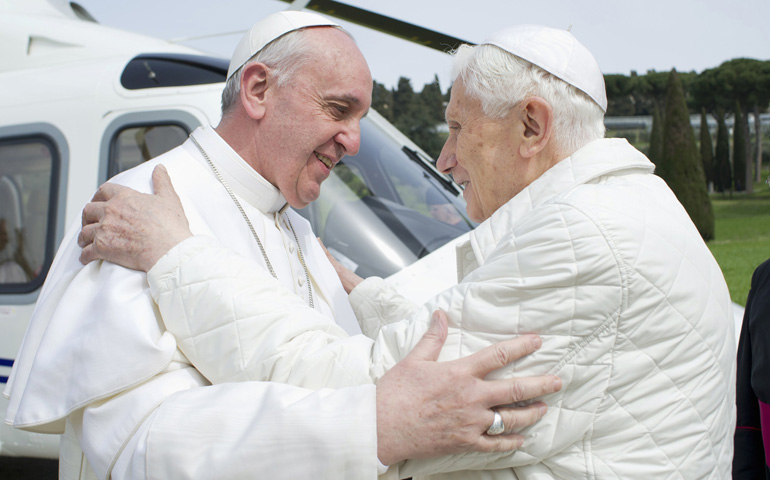reddogs
Member
The Council of Trent was held in an attempt to destroy the progress of the Protestant Reformation; it approved many pagan and unbiblical beliefs and declared it was to be accepted under the threat of "anathema".
The Council of Trent declared in its proclamation's the following:
It denied all the doctrines of the Reformation, from Sola Scriptura to "salvation by grace through faith alone" and pronounced anathemas (basically eternal damnation) upon anyone believing what the scripture shows and the Reformation held and preached.
It gave equal value and authority of tradition and Scripture (in actuality, tradition is held above Scripture) and so allowed for all the pagan rites and rituals it had allowed into the church.
Declared the Scriptures was for the priesthood only, and prohibited to anyone in the laity without written permission from one's superior -- to violate this was considered a mortal sin.
Confirmed the seven sacraments which basically were of pagan origin in the form they brought in. They held seven sacraments: baptism, confirmation, Eucharist (mass), penance/reconciliation (indulgences), extreme unction (last rights), marriage, and orders (ordination). Although not even formally decreed until the Council of Florence in 1439, the Council of Trent later declared all to be anathema whom do not hold Rome's position that it was Christ Himself who instituted these seven sacraments, but the form they used were from paganism more than anything from scripture.
Confirmed Purgatory which has no biblical basis but of pagan origin.Though of pagan origin, the Roman Church proclaimed it as an article of faith in 1439 at the Council of Florence, and it was confirmed by Trent in 1548. The Catholic Church teaches that even those "who die in the state of grace" (i.e., saved and sins forgiven) must still spend an indefinite time being purged/purified (i.e., expiated of sins/cleansed for heaven).
Confirmed the use Indulgences of which clearly is not sanctioned by the scriptures.
Confirmed the Mass as a propitiatory offering.The Mass was unknown in the early church, the mass did not become an official doctrine until pronounced by the Lateran Council of 1215 under the direction of Pope Innocent III, and reaffirmed by the Council of Trent.
Confirmed the perpetual virginity of Mary. The Lateran Council of 469 under Pope Martin I declared: "if anyone does not confess in harmony with the holy Fathers that the holy and ever virgin and immaculate Mary is really and truly the mother of God, inasmuch as she in the last times and without semen by the Holy Spirit conceived God the Word himself specially and truthfully, who was born from God the Father before all ages, and she bore him uncorrupted, and after his birth her virginity remaining indissoluble, let him be condemned." The perpetual virginity of Mary thus became an official teaching of the church: Mary was a virgin before, during, and after the birth of Jesus. In 1555, the Council of Trent confirmed this dogma in the Constitution of Pope Paul IV known as "Cum Quorundam." Here the pope warns against teaching that "the same blessed Virgin Mary is not truly the Mother of God, and did not remain always in the integrity of virginity, i. e., before birth, in birth, and perpetually after birth."
Some of the of the Anathemas of Trent:
"If any one shall deny that the body and blood together with the soul and divinity of our Lord Jesus Christ, and therefore entire Christ, are truly, really, and substantially contained in the sacrament of the most holy Eucharist; and shall say that He is only in it as a sign, or in a figure, or virtually -- let him be accursed." (Canon 1).
"If any one shall say that the substance of the bread and wine remains in the sacrament of the most holy Eucharist, together with the body and blood of our Lord Jesus Christ, and shall deny that wonderful and singular conversion of the whole substance of the bread into the body, and of the whole substance of the wine into the blood, the outward forms of the bread and wine still remaining, which conversion the Catholic church most aptly calls transubstantiation, let him be accursed."(Canon 2).
"If any one shall deny, that in the venerated sacrament of the Eucharist, entire Christ is contained in each kind, and in each several particle of either kind when separated, let him be accursed."(Canon 3).
"If any one shall say that, after consecration, the body and blood of our Lord Jesus Christ is only in the wonderful sacrament of the Eucharist in use whilst it is taken, and not either before or after, and that the true body of the Lord does not remain in the hosts or particles which have been consecrated, and which are reserved, or remain after the communion, let him be accursed."(Canon 4).
"If any one says that the principal fruit of the most holy Eucharist is the remission of sins or that other effects do not result from it, let him be accursed." (Canon 5).
"If any man shall say that Christ, the only begotten Son of God, is not to be adored in the holy sacrament of the Eucharist, even with the open worship of latria, and therefore not to be venerated with any peculiar festal celebrity, nor to be solemnly carried about in processions according to the praiseworthy, and universal rites and customs of the holy Church, and that he is not to be publicly set before the people to be adored, and that his adorers are idolaters -- let him be accursed." (Canon 6).
"If anyone shall say that the ungodly man is justified by faith only so as to understand that nothing else is required that may cooperate to obtain the grace of justification, and that it is in no wise necessary for him to be prepared and disposed by the motion of his own will ... let him be accursed." (Canon 9).
"If anyone shall say that justifying faith is nothing else than confidence in the divine mercy pardoning sins for Christ's sake, or that it is that confidence alone by which we are justified ... let him be accursed." (Canon 12).
Here we see the Council of Trent sets forth the pagan 'Mystery' of the Eucharist.
Now in the sacrament of the Eucharist, was the doctrine of Transubstantiation (in Latin, transsubstantiatio, in Greek metousiosis) which is the change whereby, according to the teaching of the Catholic Church, the bread and the wine used in the sacrament of the Eucharist become, not merely as by a sign or a figure, but also in actual reality the body and blood of Christ. However the doctrine of transubstantiation does not date back to the Last Supper as is supposed.
We find 'transubstantiation origin is from paganism, and was first practiced by pagan religions. The idea of transubstantiation was characteristic of the religion of Mithra whose sacraments of cakes and Haoma drink closely parallel the Catholic Eucharistic rite. The noted historian Durant said that belief in transubstantiation as practiced by the priests of the Roman Catholic system is "one of the oldest ceremonies of primitive religion." The Story Of Civilization, p. 741. In Egypt priests would consecrate mest cakes which were supposed to be come the flesh of Osiris.' Encyclopedia Of Religions, Vol. 2, p. 76.
It was never held in the early church and took many centuries before officially becoming an article of faith by the church of Rome, which means that it is essential to salvation according to the Roman Catholic Church. The idea of a corporal presence was not part of beliefs, but in 831 A.D. Paschasius Radbertus, a Benedictine monk, published a treatise openly advocating the doctrine of transubstantiation. Even then, for almost another four hundred years, theological debate waged over this teaching by bishops and people alike until at the Fourth Lateran Council in 1215 A.D., it was officially defined and canonized as a dogma.
The Council of Trent declared in its proclamation's the following:
It denied all the doctrines of the Reformation, from Sola Scriptura to "salvation by grace through faith alone" and pronounced anathemas (basically eternal damnation) upon anyone believing what the scripture shows and the Reformation held and preached.
It gave equal value and authority of tradition and Scripture (in actuality, tradition is held above Scripture) and so allowed for all the pagan rites and rituals it had allowed into the church.
Declared the Scriptures was for the priesthood only, and prohibited to anyone in the laity without written permission from one's superior -- to violate this was considered a mortal sin.
Confirmed the seven sacraments which basically were of pagan origin in the form they brought in. They held seven sacraments: baptism, confirmation, Eucharist (mass), penance/reconciliation (indulgences), extreme unction (last rights), marriage, and orders (ordination). Although not even formally decreed until the Council of Florence in 1439, the Council of Trent later declared all to be anathema whom do not hold Rome's position that it was Christ Himself who instituted these seven sacraments, but the form they used were from paganism more than anything from scripture.
Confirmed Purgatory which has no biblical basis but of pagan origin.Though of pagan origin, the Roman Church proclaimed it as an article of faith in 1439 at the Council of Florence, and it was confirmed by Trent in 1548. The Catholic Church teaches that even those "who die in the state of grace" (i.e., saved and sins forgiven) must still spend an indefinite time being purged/purified (i.e., expiated of sins/cleansed for heaven).
Confirmed the use Indulgences of which clearly is not sanctioned by the scriptures.
Confirmed the Mass as a propitiatory offering.The Mass was unknown in the early church, the mass did not become an official doctrine until pronounced by the Lateran Council of 1215 under the direction of Pope Innocent III, and reaffirmed by the Council of Trent.
Confirmed the perpetual virginity of Mary. The Lateran Council of 469 under Pope Martin I declared: "if anyone does not confess in harmony with the holy Fathers that the holy and ever virgin and immaculate Mary is really and truly the mother of God, inasmuch as she in the last times and without semen by the Holy Spirit conceived God the Word himself specially and truthfully, who was born from God the Father before all ages, and she bore him uncorrupted, and after his birth her virginity remaining indissoluble, let him be condemned." The perpetual virginity of Mary thus became an official teaching of the church: Mary was a virgin before, during, and after the birth of Jesus. In 1555, the Council of Trent confirmed this dogma in the Constitution of Pope Paul IV known as "Cum Quorundam." Here the pope warns against teaching that "the same blessed Virgin Mary is not truly the Mother of God, and did not remain always in the integrity of virginity, i. e., before birth, in birth, and perpetually after birth."
Some of the of the Anathemas of Trent:
"If any one shall deny that the body and blood together with the soul and divinity of our Lord Jesus Christ, and therefore entire Christ, are truly, really, and substantially contained in the sacrament of the most holy Eucharist; and shall say that He is only in it as a sign, or in a figure, or virtually -- let him be accursed." (Canon 1).
"If any one shall say that the substance of the bread and wine remains in the sacrament of the most holy Eucharist, together with the body and blood of our Lord Jesus Christ, and shall deny that wonderful and singular conversion of the whole substance of the bread into the body, and of the whole substance of the wine into the blood, the outward forms of the bread and wine still remaining, which conversion the Catholic church most aptly calls transubstantiation, let him be accursed."(Canon 2).
"If any one shall deny, that in the venerated sacrament of the Eucharist, entire Christ is contained in each kind, and in each several particle of either kind when separated, let him be accursed."(Canon 3).
"If any one shall say that, after consecration, the body and blood of our Lord Jesus Christ is only in the wonderful sacrament of the Eucharist in use whilst it is taken, and not either before or after, and that the true body of the Lord does not remain in the hosts or particles which have been consecrated, and which are reserved, or remain after the communion, let him be accursed."(Canon 4).
"If any one says that the principal fruit of the most holy Eucharist is the remission of sins or that other effects do not result from it, let him be accursed." (Canon 5).
"If any man shall say that Christ, the only begotten Son of God, is not to be adored in the holy sacrament of the Eucharist, even with the open worship of latria, and therefore not to be venerated with any peculiar festal celebrity, nor to be solemnly carried about in processions according to the praiseworthy, and universal rites and customs of the holy Church, and that he is not to be publicly set before the people to be adored, and that his adorers are idolaters -- let him be accursed." (Canon 6).
"If anyone shall say that the ungodly man is justified by faith only so as to understand that nothing else is required that may cooperate to obtain the grace of justification, and that it is in no wise necessary for him to be prepared and disposed by the motion of his own will ... let him be accursed." (Canon 9).
"If anyone shall say that justifying faith is nothing else than confidence in the divine mercy pardoning sins for Christ's sake, or that it is that confidence alone by which we are justified ... let him be accursed." (Canon 12).
Here we see the Council of Trent sets forth the pagan 'Mystery' of the Eucharist.
Now in the sacrament of the Eucharist, was the doctrine of Transubstantiation (in Latin, transsubstantiatio, in Greek metousiosis) which is the change whereby, according to the teaching of the Catholic Church, the bread and the wine used in the sacrament of the Eucharist become, not merely as by a sign or a figure, but also in actual reality the body and blood of Christ. However the doctrine of transubstantiation does not date back to the Last Supper as is supposed.
We find 'transubstantiation origin is from paganism, and was first practiced by pagan religions. The idea of transubstantiation was characteristic of the religion of Mithra whose sacraments of cakes and Haoma drink closely parallel the Catholic Eucharistic rite. The noted historian Durant said that belief in transubstantiation as practiced by the priests of the Roman Catholic system is "one of the oldest ceremonies of primitive religion." The Story Of Civilization, p. 741. In Egypt priests would consecrate mest cakes which were supposed to be come the flesh of Osiris.' Encyclopedia Of Religions, Vol. 2, p. 76.
It was never held in the early church and took many centuries before officially becoming an article of faith by the church of Rome, which means that it is essential to salvation according to the Roman Catholic Church. The idea of a corporal presence was not part of beliefs, but in 831 A.D. Paschasius Radbertus, a Benedictine monk, published a treatise openly advocating the doctrine of transubstantiation. Even then, for almost another four hundred years, theological debate waged over this teaching by bishops and people alike until at the Fourth Lateran Council in 1215 A.D., it was officially defined and canonized as a dogma.






